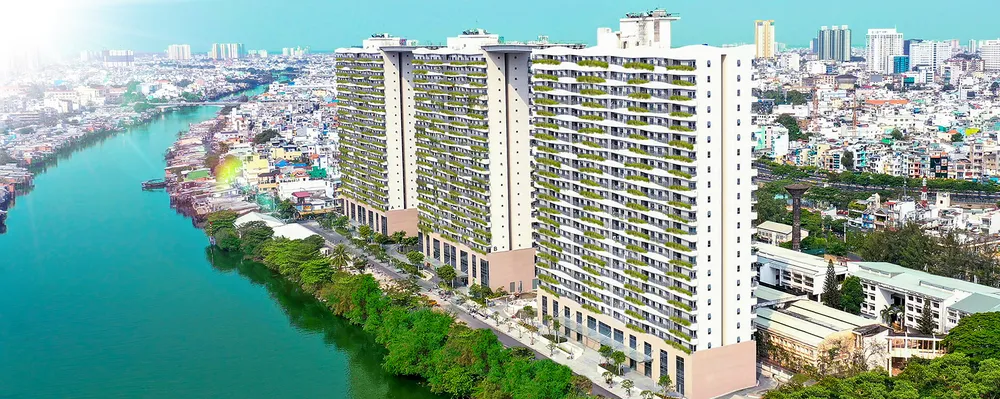
Advancing Toward Zero-Carbon Buildings
Carbon emissions stemming from building operations have surged to an all-time high, reaching approximately 10 GtCO2, marking a 5% increase from 2020 and a 2% rise from the previous peak in 2019. Consequently, curtailing carbon emissions in construction projects plays a pivotal role in achieving the overarching objective of reducing carbon emissions.
According to Decree 06/2022/ND-CP, issued by the Vietnamese Government on January 7, 2022, which regulates greenhouse gas (GHG) emissions mitigation and ozone layer protection, Vietnam aims to reduce greenhouse gas emissions by 563.8 million tons of CO2eq (CO2 equivalent) by 2030. The Ministry of Construction's share of GHG emission reduction is set at 74.3 million tons of CO2eq, stemming from industrial processes, energy consumption in cement production, and building operations.
Furthermore, Decree 06 mandates GHG-emitting facilities to conduct GHG inventories, necessitating businesses and commercial buildings to monitor their GHG emissions closely. Businesses must adapt to meet these new requirements. However, if emissions surpass the allocated quotas, businesses can seek an alternative solution by participating in the carbon credit market.
The World Green Building Council (WGBC) has outlined a vision and action framework for 2030, with the goal of achieving zero operational carbon for all new construction projects and reducing energy-related embodied carbon by 40%. By 2050, all buildings, both existing and newly constructed, must attain zero operational carbon, while newly built structures must achieve zero carbon content. According to the whole-life cycle approach to buildings, a zero-carbon building is one that produces zero operational and embodied carbon.
To achieve a zero-carbon building, a strong emphasis is placed on high energy efficiency solutions, combined with meeting 100% of a building's energy requirements through on-site or external renewable energy sources. For projects to attain zero carbon content, every effort must be made to minimize carbon content, such as renovating the building and using low-carbon construction materials. Any remaining carbon content can be offset by participating in carbon credit exchanges. WGBC stipulates that to qualify as "net zero," less than 10% of carbon emissions must be offset.
Moreover, to attract green capital into real estate, green products and green projects are essential. Consequently, the carbon credit market serves as a driving force for the future development of the real estate sector. It is evident that the carbon credit market is imperative for the construction and real estate industries to progress toward Net Zero Carbon. In this context, real estate companies have the opportunity to take a proactive role in leading the way in the carbon credit market by offering products aimed at achieving Net Zero Carbon.
Applying Green Standards Across All Projects
In recent years, Vietnam has established a legal framework and policies to establish a carbon market through decrees, decisions, and circulars. Building upon Decree 06/2022 from the government, the Ministry of Finance, in conjunction with the Ministry of Natural Resources and Environment, has developed a draft project titled "Developing the Carbon Market in Vietnam."
Within this context, PKC stands as a green building developer with a mission to "pioneer and promote the creation of a better lifestyle, public health, and a sustainable humanistic ecological environment according to global green standards." To achieve this goal, PKC has provided guidance, strategies, and business policies for the company, its partners, and customers. Additionally, it collaborates with other businesses, contributing to the formation of the carbon market and the reduction of carbon emissions, aligning with the objectives of environmental protection and climate adaptation in Ho Chi Minh City and across the nation.
PKC has implemented several strategies to reduce carbon emissions, including a commitment to apply green building standards to all real estate projects developed by the company. These standards encompass LEED (USA), LOTUS (Vietnam Green Building Council), EDGE (IFC), and Green Mark (BCA Singapore), with each standard tailored to specific project types and segments. The overarching aim is to incorporate green standards into the new urban areas that PKC will develop.
Furthermore, PKC is actively researching and implementing energy management strategies across its projects, focusing on raising environmental awareness, especially concerning forest conservation. This includes providing training programs to raise awareness among company employees and adhering to regulations set by the FSC Forest Stewardship Council, ensuring the clear origin of wood materials.
PKC is also prioritizing the use of renewable energy by researching and transitioning from grid-based electrical energy to renewable sources, with a particular emphasis on solar energy. This involves the installation of solar power systems with solar panels on project roofs and employee garages, as well as the deployment of solar lighting systems within project parks.
PKC is making substantial investments in clean technology and smart, automated management systems. These systems optimize energy consumption within projects, incorporating features such as automatic sensor systems for lighting control, stringent requirements for inverter air conditioning systems, and automated watering systems.
In conclusion, the development of the carbon credit market in Vietnam is poised to be a game-changer, offering the real estate sector a unique opportunity to contribute significantly to emissions reduction and sustainable development. By embracing green building standards and proactive carbon emission reduction strategies, forward-thinking companies like PKC are not only shaping the future of the real estate industry but also leading the way in promoting environmental sustainability.




















